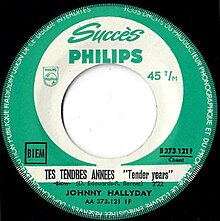
Sylvie Vartan is a Bulgarian-French singer and actress. She is known as one of the most productive and tough-sounding yé-yéartists. Her performances often featured elaborate show-dance choreography,and she made many appearances on French and Italian TV.
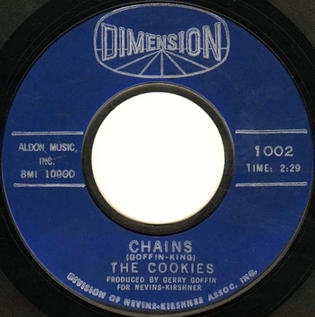
"Chains" is a rhythm and blues song written by husband-and-wife songwriting team Gerry Goffin and Carole King. It was a hit for the American girl group the Cookies in 1962 and for the English rock band the Beatles,who recorded the song for their debut album in 1963. King recorded a solo version of "Chains" for her 1980 album Pearls:Songs of Goffin and King.
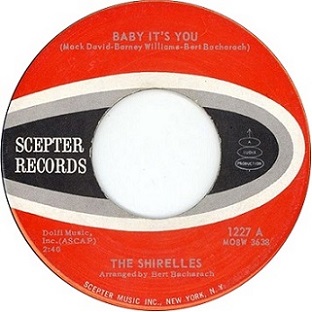
"Baby It's You" is a song written by Burt Bacharach (music),Luther Dixon,and Mack David (lyrics). It was recorded by the Shirelles and the Beatles and was a hit for both. The highest-charting version of "Baby It's You" was by the band Smith,who took the track to No.5 on the US charts in 1969.

"Breaking Up Is Hard to Do" is a song recorded by Neil Sedaka,co-written by Sedaka and Howard Greenfield. Sedaka recorded this song twice,in 1962 and 1975,in two significantly different arrangements,and it is considered to be his signature song. Between 1970 and 1975,it was a top-40 hit three separate times for three separate artists:Lenny Welch,The Partridge Family and Sedaka's second version. The song was also adapted into multiple languages,most notably in Italian and French.
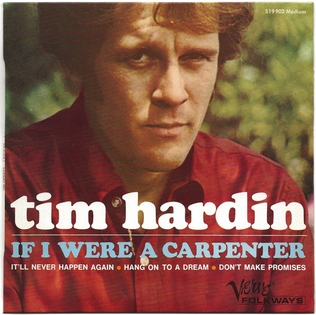
"If I Were a Carpenter" is a folk song written by Tim Hardin in the 1960s,and re-recorded with commercial success by various artists including Bobby Darin,The Four Tops and Johnny Cash. Hardin's own recording of the piece appeared on his 1967 album Tim Hardin 2. It was one of two songs from that release performed by Hardin at Woodstock in 1969. The song,believed by some to be about male romantic insecurity,is rumored to have been inspired by his love for actress Susan Morss,as well as the construction of Hardin's recording studio.

"Bad,Bad Leroy Brown" is an uptempo,strophic story song written by American folk rock singer Jim Croce. Released as part of his 1973 album Life and Times,the song was a No. 1 hit for him,spending two weeks at the top of the Billboard Hot 100 in July 1973. Billboard ranked it as the No. 2 song for 1973.

"Break It to Me Gently" is a pop song written by blues musician Joe Seneca with lyrics by Diane Lampert. Both Brenda Lee and Juice Newton were met with considerable success with their versions of the song.

"Rhythm of the Rain" is a song performed by The Cascades,released in November 1962 in the US and on January 25,1963 in the UK. It was written by Cascades band member John Claude Gummoe. On March 9,1963,it rose to number 3 on the Billboard Hot 100,and spent two weeks at number 1 on Billboard's Easy Listening chart. Billboard ranked the record as the number 4 song of 1963.

"Da Doo Ron Ron (When He Walked Me Home)" is a song written by Jeff Barry,Ellie Greenwich and Phil Spector. It first became a popular top five hit single for the American girl group the Crystals in 1963. American teen idol Shaun Cassidy recorded the song in 1977 and his version hit number one on the Billboard Hot 100 chart. There have also been many other cover versions of this song,including one by the songwriters Jeff Barry and Ellie Greenwich themselves,performing as the Raindrops.

"The Game of Love" is a 1964 song by Wayne Fontana and the Mindbenders,first released as a single from the band's titular album in January 1965 in the United Kingdom,followed by the United States one month later as "Game of Love". The song reached Number 2 on the UK Singles chart and Number 1 on the US Billboard Hot 100 that year. The song also spawned multiple successful cover versions,including a version by Ian "Tex Pistol" Morris that was a Number 1 hit in New Zealand in 1987. The song was also adapted into French by Frank Gérald as "Quand tu es là" and was recorded by French pop singer Sylvie Vartan,first in July 1965 as the second single off of her 1966 studio album "Il y a deux filles en moi" that was a hit in French-speaking Belgium,followed by a re-recording in 1990,released as a non-album single,that was a minor hit in France.
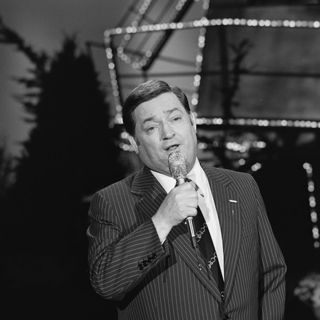
Carel Verbrugge,known as Willy Alberti,was a Dutch singer,who sang in Dutch and Italian. He was also an actor and a radio and TV personality.

"(You're the) Devil in Disguise" is a 1963 single by Elvis Presley. It was written by Bill Giant,Bernie Baum,and Florence Kaye and was published by Elvis Presley Music in June 1963. The song peaked at No. 3 on the U.S. Billboard Hot 100 on August 10,1963,and No. 9 on the Billboard Rhythm and Blues chart,becoming his final top-ten single on the Rhythm and Blues chart. The song also topped Japan's Utamatic record chart in the fall of 1963. The single was certified gold by the RIAA for sales in excess of 500,000 units in the US.

"Love or Let Me Be Lonely" is a pop song recorded by the soul group The Friends of Distinction and released as a single in early 1970. The song was a multi-format success,peaking in the top 10 of the Billboard Hot 100 at #6 on May 1,1970 and at #13 on the R&B chart. On the Adult Contemporary singles charts,"Love or Let Me Be Lonely" went to #9. The song is ranked as the 63rd biggest hit of 1970.

"Ya Ya" is a song by Lee Dorsey. The song was written by Dorsey,C. L. Blast,Bobby Robinson,and Morris Levy. Levy's participation in the writing has been called into question;the Flashback release of the single lists only Dorsey and Blast as writers,as do the liner notes to the American Graffiti soundtrack.

"Black Is Black" is a song by the Spanish rock band Los Bravos,released in 1966 as the group's debut single for Decca Records. Produced by Ivor Raymonde,it reached number two in the UK,number four in the US,and number one in Canada. With the recording's success,Los Bravos became the first Spanish rock band to have an international hit single. A dance remix was released as a single in 1986.
"Darlin'" is a song written in 1970 by English sax player Oscar Stewart Blandamer. It was first released under the title "Darling" by the British country band Poacher in 1978. It was later a chart hit for Frankie Miller and David Rogers. The track was subsequently recorded by numerous artists including Tom Jones,Barbara Mandrell,Smokie and Johnny Reid.

"J'ai un problème" is a French language song,a duet by then-married couple Sylvie Vartan and Johnny Hallyday. The single cover credited the duo as "Sylvie &Johnny".

"Ma guitare" is a song by French singer Johnny Hallyday from the 1963 film D'oùviens-tu Johnny? It was also released on a double A-side single.

"Summerlove Sensation" is a song originally recorded by the Bay City Rollers. It was part of their 1974 album Rollin'. In the same year,it was also released as a single five months prior. The single peaked at no. 3 on the UK Singles Chart. It also spawned two successful cover versions in the late 1970s,first a French adaption performed by French pop singer Sylvie Vartan,and a cover by American singer Bobby Vinton that was a minor hit in the charts.
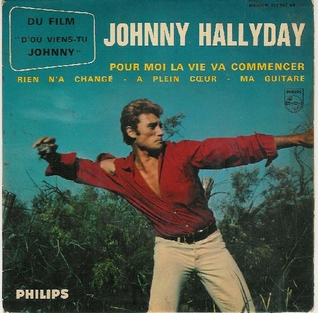
"Pour moi la vie va commencer" is a song by written by French singer-songwriter Jean-Jacques Debout and performed by French singer Johnny Hallyday. It was released in October 1963,coinciding with the release of the film "D'oùviens-tu Johnny",starring Hallyday and fellow singer and future wife Sylvie Vartan,of which the song is featured on.

